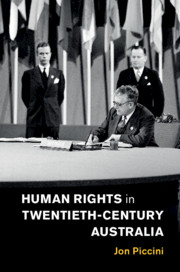‘In this fascinating account of how global ideas travel, Jon Piccini illuminates how Australians invoked universal human rights in pursuit of political and social reforms. By carefully charting the ways the concept was deployed by groups ranging from Indigenous Australians to anti-abortion evangelicals, Piccini offers a fresh reading of the capacities and the limits of this supple moral language.'
Barbara Keys - author of Reclaiming American Virtue: The Human Rights Revolution of the 1970s
'This major contribution to understanding Australia's national navigation of the human rights idea and its place within wider global rights represents a strikingly impressive intervention. It interacts with some of the key trends within the grander constellation of human rights history and connects with the changing contours of human rights as an international discourse and transnational social movement.'
Roland Burke - author of Decolonisation and the Evolution of International Human Rights
‘Australia has no bill of rights, but human rights talk permeates its culture and politics. Jon Piccini has for the first time explained the history of this paradox, in a significant contribution to our understanding of how the appeal to human rights became both pervasive and contested in modern Australia.'
Frank Bongiorno - author of The Eighties: The Decade That Transformed Australia
‘Human Rights in Twentieth-Century Australia is an important book and Jon Piccini has set out an agenda for further research which I hope students of Australian history will seek to follow. He has also presented Australias … record on human rights to an international audience and this will no doubt inspire future conversations and comparisons in global settings.’
Julia T. Martínez
Source: History Australia
‘Jon Piccini’s excellent history of human rights in twentieth century Australia joins a growing number of ‘national human rights histories’ that seek to show how domestic political and civil movements engaged with the emergent global discourse of human rights … This book, which draws on a wide range of Australian newspapers, manuscript collections, archives, and publications from a wide range of civil liberties, human rights, indigenous rights, and sectarian organizations, should appeal to historians of modern Australian politics and foreign policy, indigenous transnationalism, and human rights more generally.’
Brad Simpson
Source: Journal of Contemporary History



